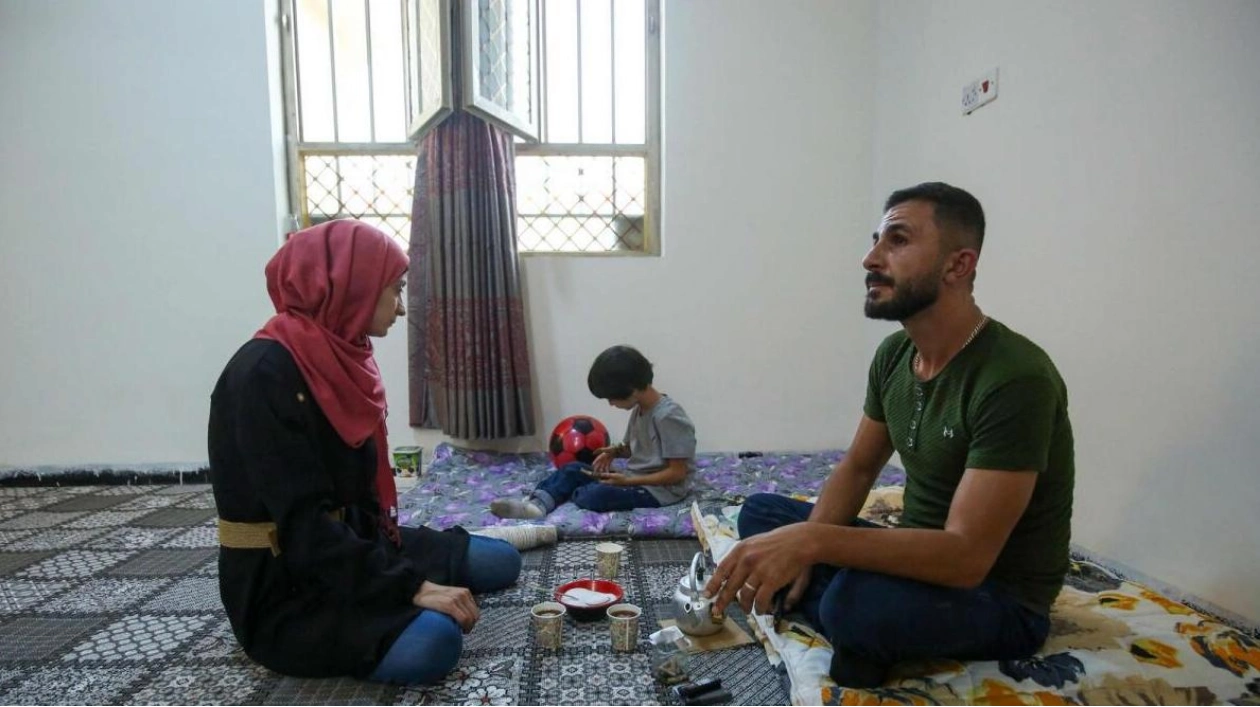In a house sheltering Lebanese refugee families evacuated from Beirut's southern suburbs due to Israeli bombardment, people gather for tea after arriving in the central Iraqi city of Hilla on October 18, 2024. — AFP
Israeli attacks on Lebanon forced Mohammed Fawaz and his family to flee repeatedly, eventually seeking refuge in central Iraq. 'Wherever we went, danger followed,' the 62-year-old Lebanese man with white hair said in the small town of Al Qassem, seated with his wife and daughter. 'That's when I thought of Iraq. It was the only way I could see to escape the danger after we saw death with our own eyes.'
Across the road from their modest home, tall palm trees, symbolic of Iraq's Babylon province, stretch as far as the eye can see. According to the United Nations refugee agency UNHCR, over 19,200 Lebanese have sought refuge in Iraq since hostilities escalated in Lebanon.
The Baghdad government and Shia religious authorities swiftly mobilized to accommodate the influx, as did the Hashed Al Shaabi, an alliance of pro-Iran former paramilitary groups now integrated into Iraq's security forces. The solidarity underscores the strong ties between the Shia communities of both countries.
Iraq has traditionally welcomed Lebanese pilgrims visiting its revered Shiite shrines at Karbala and Najaf. Now, the Baghdad government, dominated by pro-Iran parties, is signaling its unwavering support for Lebanon amid daily Israeli attacks on Hezbollah strongholds.
Fawaz, originally from south Lebanon, moved to Beirut's southern suburbs before relocating to the outskirts of the capital. 'We fled from place to place,' he said, tearfully recalling relatives still in Lebanon. 'My displaced brothers now live in schools in different areas.' His journey to Iraq involved a coach trip across Syria, with entry coordinated by the Hashed Al Shaabi after a stopover at the Sayyida Zeinab area, home to a Shia shrine protected by pro-Iran groups.
Fawaz praised the 'best welcome' and Iraqi generosity, particularly from his host in Al Qassem. He commended Iraq's government for treating them as 'invited guests, not refugees.'
The war in Lebanon has displaced at least 1.3 million people, according to the UN migration agency, with over half a million fleeing to neighboring Syria. Those who stayed often find themselves in makeshift shelters in schools. Iraq has facilitated the arrivals by extending visas and providing travel documents for those without passports, coordinated with the Lebanese embassy.
The UNHCR reports that about 62% of the Lebanese arrivals are women and children, who will attend Iraqi schools. Nearly half are housed in Najaf and Karbala, home to the gold-domed mausoleums of the Imam Hussein and his brother Abbas. Religious authorities have converted hotels reserved for pilgrims into temporary shelters.
Jalal Assi, in his 40s, now resides in Karbala. 'We had no alternative, and decided to come to Iraq,' he said, citing the 'facilities offered to Lebanese.' 'We hope the situation will improve and security will be restored so we can return home,' he added.
Neemat Mussa, 44, from the south Lebanese village of Hariss, lives in Hilla with her husband, two daughters, and an aunt, housed by an Iraqi police officer. A local benefactor assists with their shopping and expenses. 'We chose Iraq because it's a safe place where we are not afraid,' she said, despite her weariness. Though it's her first visit, her husband had previously come on pilgrimage.
The warmth of Iraq's welcome does not erase the pain of exile. Mussa lost her cousin and sister-in-law in the war and closely follows the news. She weeps for her lost loved ones and the country she longs to return to. 'I'm in a comfortable home, and the Iraqis ensure we lack for nothing,' she said, adding, 'But I miss my house, my country, my neighbors, and my family. That's my real home.'
Source link: https://www.khaleejtimes.com






